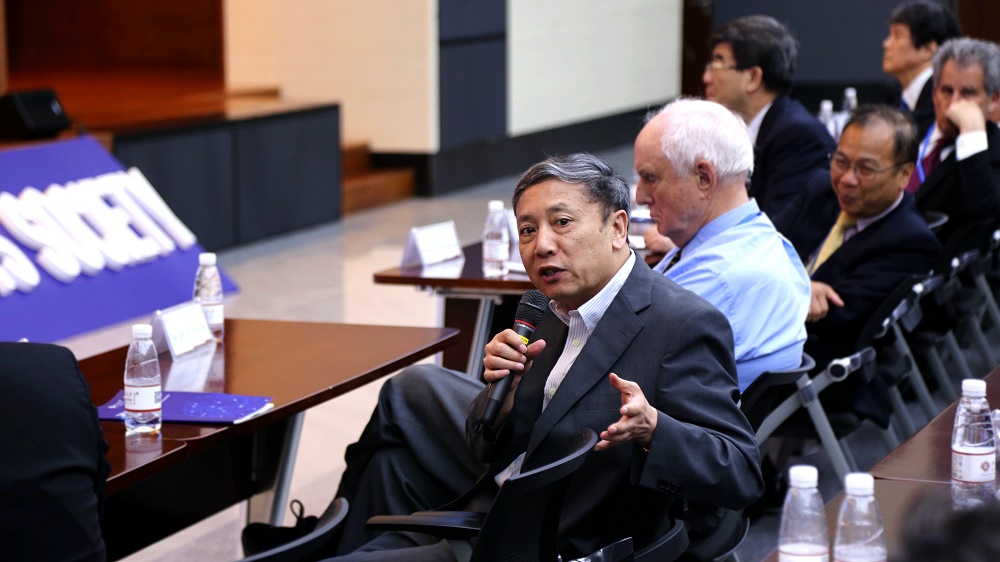
For years, we have been warned that the day will come when machines will be able to do our jobs better than we can. Now a leading Chinese economist is offering a time frame.
Cai Fang, vice-president of the Chinese Academy of Social Sciences, the country’s top think tank, and former head of its Population and Labour Economic Research Institute, said robots will “definitely” surpass humans in many job skills in 10 to 20 years.
Like Microsoft founder Bill Gates and other technology titans, Cai is an advocate of tax policies and other measures to keep robots from putting human workers out of jobs.
In February, Gates said governments should levy a tax on the use of robots to fund retraining of those who lose their jobs and to slow down automation.
“For a human worker who does US$50,000 worth of work in a factory, the income is taxed,” Gates said. “If a robot comes in to do the same thing, you’d think that we’d tax the robot at a similar level.”
Cai, a delegate to the National People’s Congress in Beijing, said the idea made sense.
As the country rides a wave of investment in automation, Cai is among the first Chinese academics to call for restrictions on robots.
“We must cap the speed and restrict the direction of robotics’ development to avoid any bad effects on human beings,” he said.
Chen Yidan, a co-founder of Chinese technology giant Tencent, said machines would eventually replace humans in most jobs, but that was no cause for fear.
“Looking back at history, this isn’t the first time that humans have experienced dramatic technological changes,” said Chen, who left Tencent in 2013 to focus on his charitable foundation.
“Technology could possibly replace some jobs, but at the same time, it also creates jobs.”
Robots are looming larger in China’s future as cheap labour – a key to its economic success over the past four decades – becomes less plentiful.
The number of working-age people – those aged 16 to 59 – has fallen since peaking in 2010 because of China’s decades-long one-child policy.
Moreover, minimum-wage increases have made Chinese workers more expensive and prompted many manufacturers to either move to Southeast Asia or, as in the case of electronics contractor Foxconn, invest heavily in automation.
The World Bank estimates that three out of four jobs in China could be replaced by automation by 2030. Developed economies will not be spared either.
In 2015, Beijing launched its Made in China 2025 initiative, which emphasised intelligent manufacturing supported by the development of industrial robots, as the main approach to integrating information and industries to make China a technology superpower.
Driven by government policies, about 3,000 new robot-related companies – robot makers or automation solutions suppliers – emerged from 2014 to 2016, mostly in the Pearl River and Yangtze River deltas, according to the China Artificial Intelligence Robot Industry Alliance.
China invested US$2.6 billion in artificial intelligence companies and start-ups in 2016, ranking second globally in the category, trailing the US with US$17.9 billion but leading Britain with US$800 million, according to data from China’s WuZhen Institute think tank.
“Demographically, China is in two races against time,” Cai said.
First, it must improve productivity before the working population declined too fast, and to achieve that, innovation and the adoption of robots were needed, he said.
“Secondly, we have to figure out in what aspects human beings are better than robots – emotional quotient, judgment or creative thinking?
“Then we can make a plan to compensate the weakest group of people – workers replaced by robots and those who will never get another job.”
South Korea has introduced what is being called the world’s first tax on robots – limiting tax incentives for investment in robotics amid fears that machines will replace human workers, causing mass unemployment.
Cai did not elaborate on how he thought China should tax robots, but said the revenue generated should be used to pay for a social security system that would ensure a universal basic income for those affected.
“This is a pressing issue,” he said.







